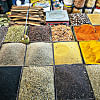Remove barriers for ensuring stable spice market

Businesspeople involved with the spice market in Bangladesh have urged the government to reduce the import duty on spices in order to keep the market stable in the upcoming month of Ramadan.
They also asked for the removal of prevailing hassles to ensure that letters of credit (LCs) can be opened without any difficulty for importing the necessary spices.
These demands came during a meeting on "stabilising the price and supply of spices" at the Directorate of National Consumer Rights Protection (DNCRP) in Karwan Bazar, Dhaka yesterday.
Problems in opening LCs, the high US dollar price and increased international commodity prices are the main reasons for instability in the domestic spice market, businesspeople said.
Ajmal Hossain Bablu, general secretary of the Moulvibazar Traders Association, said high import duty and rising US dollar prices have affected the country's spice trade.
Most spices, including cumin, were previously imported from Afghanistan, Turkey and India. However, now only cumin is being imported from India, where the price of the product has recently increased.
Bablu then said that the price of cumin currently stands at $4,200 per tonne in the neighbouring market while it was $2,800 for the same amount just two months ago.
Lutfar Rahman, president of the Mohammadpur Townhall Dhaka North City Corporation Kitchen Market Merchants Association, said there is not much time left before the month of Ramadan.
So, if proper steps are not taken to solve the problems now, there will be a kind of crisis in the market in the coming days, he added.
Due to volatility in the exchange rate of the US dollar, the cost of importing spices has increased by 25 to 35 per cent, and that is why prices in the local market are also high, businesspeople say.
The rise of urbanisation across the country is propelling demand for processed spices.
In the last one year, the price of onion has increased by 40 per cent, garlic 109 per cent, dried chili 150 per cent, ginger 123 per cent, cumin 94 per cent and clove 36 per cent, as per data from the Trading Corporation of Bangladesh.
Recently, the DNCRP found several anomalies in market surveillance of spices. For example, purchase cash memos are not maintained while import related papers are not available.
AHM Shafiquzzaman, director general of the DNCRP, said the issue regarding LC opening for importing spices would be discussed with those concerned in due time.
A report on the matter will be given to the commerce ministry so that work can be done to solve the problem quickly, he added.
Shafiquzzaman went on to say that discussions are ongoing with the National Board of Revenue regarding the duty structure for daily necessities ahead of Ramadan.
"So, the issue of spices will be considered as well," he said.

 For all latest news, follow The Daily Star's Google News channel.
For all latest news, follow The Daily Star's Google News channel. 







Comments